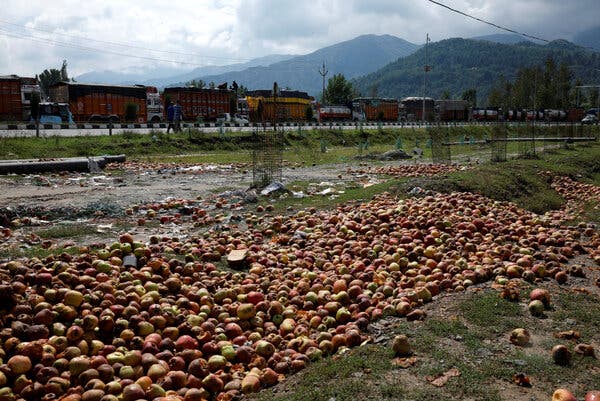Kashmir’s Apple Crop Devastated as Landslide Halts Harvesting

Heavy rains in August 2023 have wreaked havoc on Kashmir’s apple harvest, leaving crops decaying in the orchards of Pulwama, a region within India-controlled Jammu and Kashmir. The extreme weather resulted in widespread flooding and a significant landslide that blocked approximately 300 meters of a crucial highway, isolating local farmers from their customers.
Mohammed Ashraf, an apple grower from Pulwama, has witnessed a devastating loss, with about 80 percent of his crop lying unpicked and rotting on the ground. The highway, which connects Kashmir to the rest of India, was shut for nearly two weeks in late August. Even after the reopening, heavy trucks were restricted from using the road until September 17 to facilitate repairs, effectively stranding harvested apples that were packed and ready for transport.
Kashmir is a vital supplier of apples to India, contributing over 70 percent of the nation’s total output, which exceeds two million tons annually. The most commonly cultivated varieties, including Kullu Delicious and Red Delicious, are harvested in September, coinciding with the peak season for apple sales. Apples play a significant role in the region’s economy, accounting for approximately 10 percent of its total income.
The economic impact of this year’s harvest failure is staggering. According to Bashir Ahmad Bashir, chairman of the Kashmir Valley Fruit Growers and Dealers Union, the financial losses have already surpassed $226 million and continue to escalate as more apples spoil.
Perishable by nature, apples require prompt delivery to markets, ideally within two to three days. Without access to refrigerated transportation, the risk of spoilage increases dramatically. This season’s challenges have left approximately seven million people in Kashmir, who depend on the apple trade for their livelihoods, facing uncertainty and economic distress.
As farmers like Ashraf survey their orchards, the implications of this year’s disaster extend beyond individual losses. The broader agricultural landscape in Kashmir is at risk, with many growers questioning how to recover from such extensive devastation. The situation serves as a reminder of the vulnerabilities faced by agricultural communities in the wake of climate-related events.
The urgency of addressing infrastructure issues and enhancing support for local farmers has never been clearer, as Kashmir grapples with the fallout from this catastrophic harvest season.






